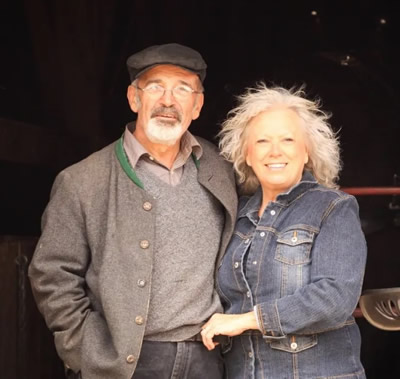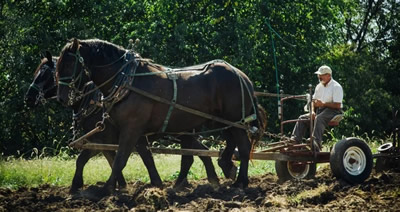Published on
Updated on
Published 6/07/2023
Story contact: Nicholas Childress, CVMMarCom@missouri.edu
Photos by Karen Clifford

Klaus and LeAnn Karbaumer are farmers from Platte City, Missouri, a small community just outside of Kansas City. Karbaumer Farm, however, is not your everyday farm. Most of the produce grown by the couple is a product of horse-power. Not to be confused with motorized horsepower, Karbaumer Farm uses a power pair of Percheron draft horses to log, mow and plow the 17-acre farm. “Horses and other draft animals are the most economical farm power available,” reads the Karbaumer Farm website. “As such, they’re a viable alternative to tractors on a small farm and provide ecological solutions to farming practices. We support the use of horse-power on small, diversified farms and for vegetable production.”
In February, Klaus sensed that something was wrong with one of horses. Sam, who is one of two Percheron draft horses working on Karbaumer Farm was not acting like his normal self. He was lowering his head, not following Klaus as he usually did, didn’t drink any water and was not as eager to get his oats in the morning. “I’ve had horses for so long that I go out and see their behavior and can immediately tell that something is wrong,” said Klaus Karbaumer. “I felt right away that he was sick.”
The couple decided to have Sam looked at by their local veterinarian who suggested a transport to Wilhite and Frees Equine Hospital in Peculiar, Missouri. The doctors at Wilhite and Frees suggested that Sam may need further care and recommended that Sam be taken to the University of Missouri College of Veterinary Medicine.
When Sam arrived at the clinic, Kile Townsend, DVM, MS, DACVIM, an assistant teaching professor of equine internal medicine, and Brianna Hamrick, DVM, an equine rotating intern, recognized that he was suffering from a colonic impaction ─ an obstruction of feed material in the gut. While being treated at the Veterinary Health Center, the horse was further diagnosed with a gastric impaction on top of the colonic impaction. According to Townsend, this can be a potentially life-threatening condition for draft horses. “Gastric impactions are somewhat common in draft horses and can complicate treatment of colonic impactions,” Townsend said. “The horse, due to his size, breed, and severity of disease was at high risk of severe complications and was managed around the clock by Dr. Hamrick and me for multiple days.”

While Sam was at Mizzou, his pulling partner, Nash, was experiencing separation anxiety. When Sam was transported to Peculiar, he and Nash were nickering back and forth to each other according to LeAnn Karbaumer. Once the trailer began pulling away, Nash began pawing the ground and crying out for Sam. “As they turned the corner down the highway, I could still hear Sam in the trailer and Nash calling out to each other,” said LeAnn. “When Nash realized that Sam was gone, he finally just went back to the barn and stood waiting. You could tell he was watching the highway, and he just didn’t move for the longest time.”
At this point, the couple had to confront the possibility that they might lose Sam and what that would mean for Karbaumer Farm. “Being in our mid-70s, we would have to decide whether to try to replace Sam with another draft or change our implements for a single horse,” said LeAnn Karbaumer. “We thought we might have to give up our mission of growing vegetables organically and being an example to other farmers who consider working with horses as a sustainable practice. As Klaus said, ‘If we lose Sam, it would be the end of Karbaumer Farm as we know it’.”
Philip Johnson, BVSc, MS, MRCVS, DACVIM, DECEIM, a professor of equine internal medicine, took over as the equine internal medicine attending clinician on the case and was able to guide the therapy that Sam needed to completely resolve the impactions, according to Townsend. “When Sam came into the clinic, we instituted aggressive fluid therapy to attempt to address the dehydration and to introduce fluid into the gut to break up and relieve the impaction,” said Townsend. “We decided to give fluids in three different ways, via a nasogastric tube, via two IV catheters and by rectal administration. The colonic impaction was hydrated and resolved via the combination of nasogastric fluids and rectal fluids. The IV fluids kept the horse hydrated, circulating blood to the organs and maintaining blood sugar through all this treatment. With a lot of patience and persistence, the impactions resolved, and we were able to start feeding Sam small amounts of feed after many days of fasting.”
Upon hearing the news that Sam was recovering, the Karbaumers were elated. “We figured a miracle had happened,” said LeAnn Karbaumer. “For that whole week that Sam was in the hospital we were talking about what would happen if we lost him. We didn’t know from one day to the next if they would be able to save him in Columbia.”
After nearly two weeks, Sam was able to return home because of the life-saving efforts of the doctors at the VHC. Townsend says that saving Sam was a big accomplishment for the team at the VHC. “This case was a huge success because we were able to treat this horse medically and got him home safe and sound to his owner,” Townsend said. “The team worked around the clock for days to care for Sam, and we were ecstatic when the outcome was favorable.”
Meanwhile, Nash had been prematurely mourning the loss of his partner but was delighted to be reunited after their time apart. Sam is currently doing well, and according to the Karbaumers, Sam and Nash will continue to work together on the farm.
The Karbaumers expressed gratitude for the team at the VHC and the compassion that they showed. “There were some pretty dark days for us, as we worried if Sam would be able to come home,” said LeAnn. “Klaus was especially distraught about the possibility of losing Sam, because his horses are like brothers to him. You cannot imagine the comfort and reassurance in those phone calls that we received from Dr. Townsend and Dr. Johnson. During our visits to see Sam in Columbia, it seemed the whole treatment team was there for us to meet them and tell us what they were doing to get Sam well.”